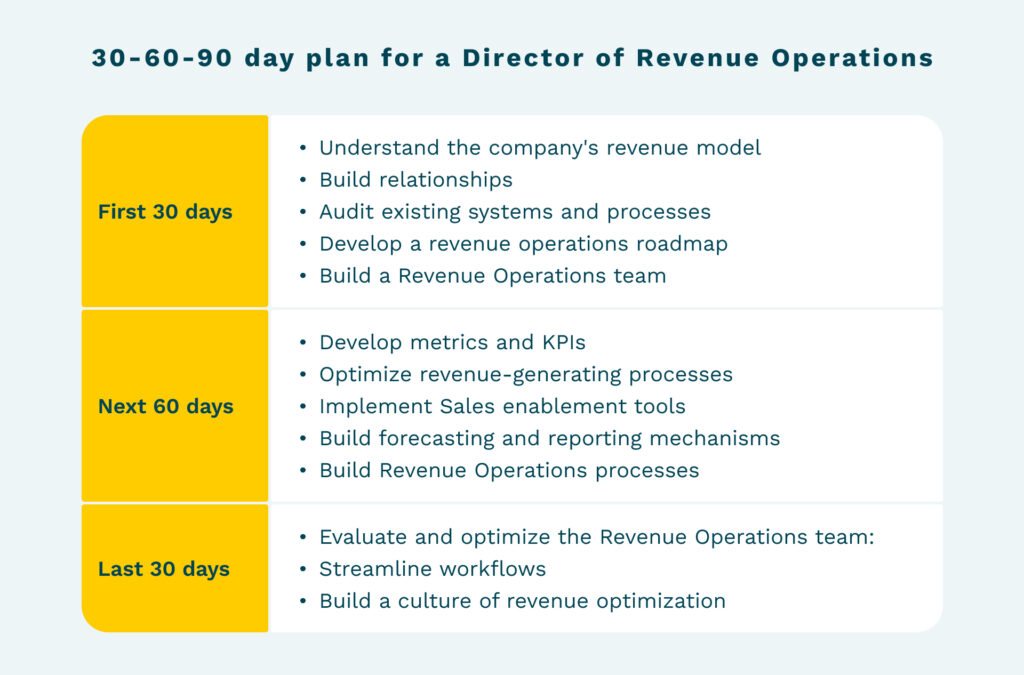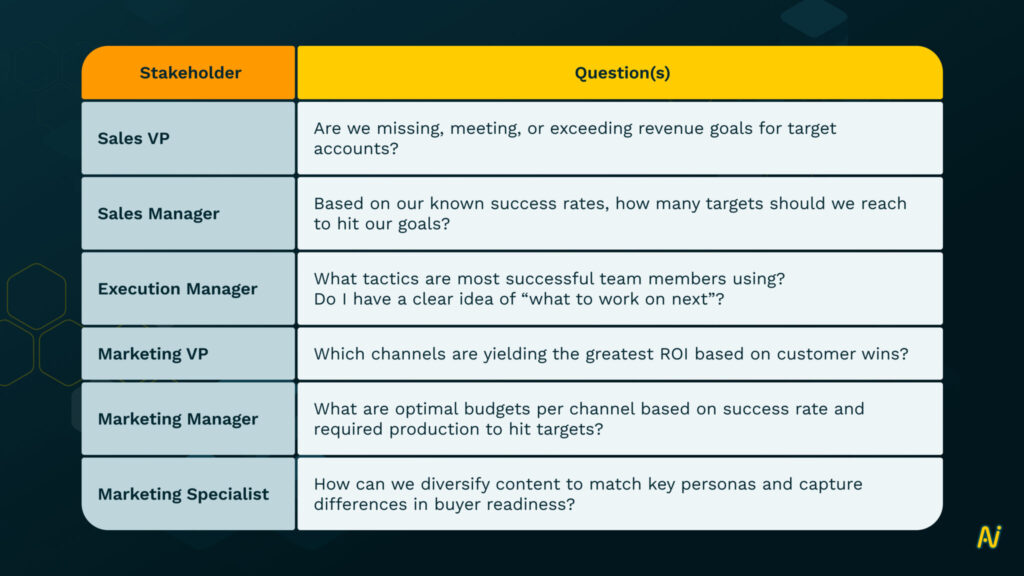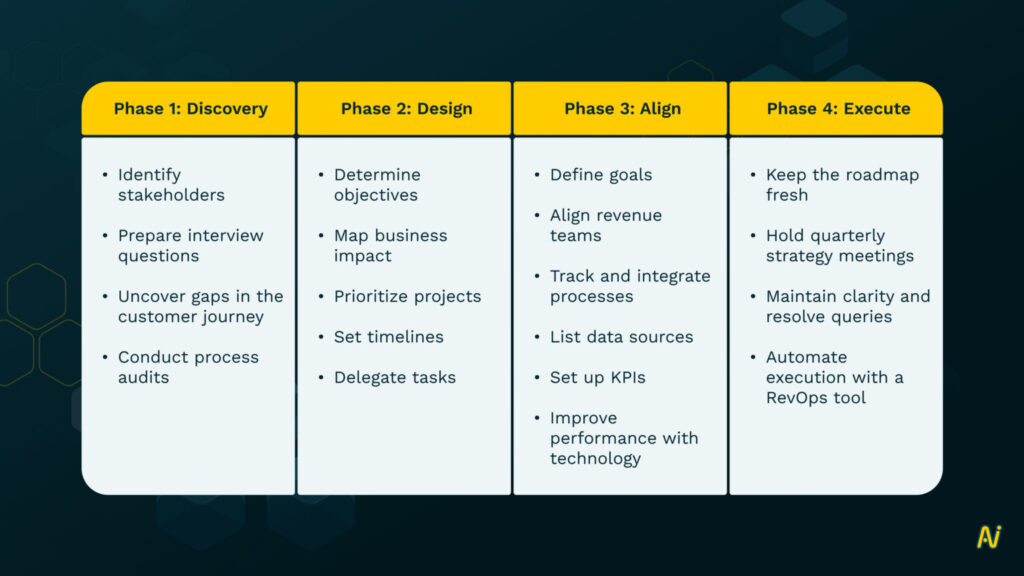Starting a new job as a Director of Revenue Operations is an exciting opportunity to make a significant impact on a company’s revenue growth. To ensure success in this role, it’s essential to have a strategic plan that guides your actions during the crucial first three months.
Here’s a 30-60-90 day plan that will help you strategically manage revenue operations and drive sustainable growth.

First 30 days for a Director of Revenue Operations
1. Understand the company’s revenue model
To build a strategic revenue operations plan, it’s essential to understand the company’s revenue model thoroughly. Learn about the business’s value proposition, target customers, and how it generates revenue. Conduct a revenue analysis to identify opportunities for growth, such as new markets, untapped customer segments, and potential upsell or cross-sell opportunities.
2. Build relationships
Building relationships with key stakeholders, including sales leaders, marketing teams, customer success, and finance leaders, is crucial to understanding their pain points and identifying areas for improvement. Schedule meetings with each of these teams to learn about their roles, understand their priorities and assess their needs.
3. Audit existing systems and processes
Review existing revenue operations systems and processes to identify bottlenecks, inefficiencies, and gaps. This will help you develop a more comprehensive understanding of how the business operates and where there is room for improvement.
4. Develop a revenue operations roadmap
Based on your analysis and audit findings, develop a revenue operations roadmap that outlines your objectives, strategies, and initiatives for the next 90 days. Ensure that your roadmap aligns with the company’s goals and vision and that it includes clear milestones and success metrics.
5. Build a Revenue Operations team
Assess the existing revenue operations team and identify any gaps. Determine whether new hires are necessary and start building a team that can help you achieve your revenue optimization goals.
Next 60 days for a Director of Revenue Operations
1. Develop metrics and KPIs
Define and implement key performance indicators (KPIs) that align with revenue objectives. Work with each team to identify KPIs that make sense for their respective areas. Ensure that your metrics and KPIs measure progress toward your revenue goals and that they enable you to make data-driven decisions.
2. Optimize revenue-generating processes
Work with sales, marketing, and customer success teams to optimize revenue-generating processes. This could include revising sales scripts, improving lead generation and qualification, and streamlining sales and customer onboarding processes.
3. Implement sales enablement tools
Evaluate and implement sales enablement tools like CRM systems, sales analytics tools, and sales training platforms. These tools can help improve the sales process and increase efficiency, enabling your team to close more deals in less time.
Track what matters! Download The Ultimate Guide to RevOps Metrics, and drive growth like never before.
4. Build forecasting and reporting mechanisms
Develop forecasting and reporting mechanisms that provide real-time visibility into revenue performance. This information can be used to identify trends and make data-driven decisions that will help you optimize revenue operations further.
5. Build revenue operations processes
Develop processes to support the Revenue Operations team, including account management processes, lead routing processes, and customer engagement processes. Documenting these processes will help ensure consistency and enable continuous improvement.
Last 30 days for a Director of Revenue Operations
1. Evaluate and optimize the Revenue Operations team
Evaluate the performance of the Revenue Operations team and make any necessary adjustments. This could include reallocating resources or making new hires to optimize the team’s productivity and effectiveness.
2. Streamline workflows
Implement automated workflows to streamline and optimize revenue-generating processes. This can reduce manual work and increase efficiency, freeing up time and resources for more strategic initiatives.
3. Build a culture of revenue optimization
Promoting a culture of revenue optimization means creating a shared mindset across the organization that prioritizes revenue growth. To achieve this, educating stakeholders, such as sales, marketing, customer success, and finance leaders, is important.
This involves sharing insights and data on revenue performance, providing training on sales techniques, discussing market trends, and sharing success stories. By promoting a culture of revenue optimization, you can create a shared commitment to driving revenue growth and make it a core part of the company’s strategy and operations.
Conclusion
In conclusion, as a first-time Director of Revenue Operations, the first 90 days are critical to establishing a solid foundation for revenue growth. By focusing on understanding the company’s revenue model, building relationships with key stakeholders, auditing existing systems and processes, developing a roadmap, and building a revenue operations team, you can set yourself up for success.
Over the next 60 days, you can optimize revenue-generating processes, implement sales enablement tools, and build forecasting and reporting mechanisms. In the final 30 days, evaluate the Revenue Operations team’s performance, streamline workflows, and promote a culture of revenue optimization.
By following this 30-60-90 day plan, you’ll be able to strategically manage revenue operations and drive sustainable growth, setting yourself and your company up for long-term success.











